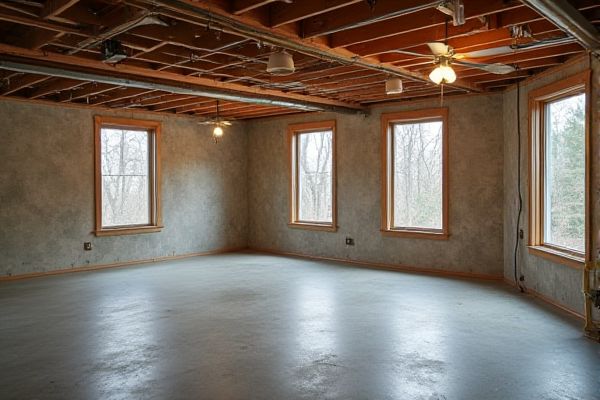
Soundproofing basement walls reduces noise transmission and creates a quieter indoor environment, while waterproofing protects the area from water damage and mold growth. Understanding the key differences between soundproofing and waterproofing can help you choose the right solution for your basement needs--explore the rest of the article to learn more.
Table of Comparison
| Feature | Soundproofing Basement | Waterproofing Basement |
|---|---|---|
| Purpose | Reduces noise transmission from outside or adjacent rooms | Prevents water intrusion and moisture buildup |
| Common Methods | Acoustic panels, insulation, resilient channels, soundproof drywall | Sealants, waterproof membranes, sump pumps, drainage systems |
| Main Benefits | Improved sound privacy, noise reduction, enhanced comfort | Prevents mold, structural damage, water damage, mildew |
| Material Types | Fiberglass insulation, mass loaded vinyl, acoustic foam | Waterproof coatings, drainage boards, vapor barriers |
| Installation Areas | Walls, ceilings, floors inside basement | Exterior walls, foundation, floor slab |
| Cost Range | Moderate; varies by materials and labor | Varies widely; can be high depending on extent |
| Maintenance | Minimal; inspect acoustic barriers periodically | Regular inspection for leaks and moisture control |
Understanding Basement Soundproofing
Basement soundproofing involves using materials like acoustic panels, insulation, and sealants to reduce noise transmission through walls, floors, and ceilings, creating a quieter indoor environment. Unlike waterproofing, which prevents water infiltration and mold growth, soundproofing specifically targets airborne and impact noises for improved comfort. Your choice of soundproofing solutions should consider basement layout and external noise sources to maximize effectiveness.
Key Benefits of Soundproofing Your Basement
Soundproofing your basement significantly reduces noise transmission, creating a quieter and more comfortable living space ideal for home theaters, music studios, or play areas. Improved sound insulation also enhances privacy by minimizing sound leaks between rooms. Furthermore, soundproofing materials often provide additional thermal insulation, contributing to energy efficiency in your basement.
What Is Basement Waterproofing?
Basement waterproofing involves sealing walls and floors to prevent water infiltration, protecting your foundation from moisture damage and mold growth. This process typically includes applying waterproof membranes, installing drainage systems, and repairing cracks to ensure a dry, healthy basement environment. Unlike soundproofing, which targets noise reduction, waterproofing specifically addresses water-related issues to preserve structural integrity.
Importance of Basement Waterproofing
Basement waterproofing is crucial for preventing water damage, mold growth, and structural issues caused by moisture infiltration. Unlike soundproofing, which targets noise reduction, waterproofing safeguards your home's foundation and indoor air quality by keeping the basement dry and protected from leaks. Investing in effective waterproofing solutions ensures long-term durability and safety for your basement environment.
Soundproofing Materials and Techniques
Effective soundproofing of basements involves using dense materials such as mass-loaded vinyl, acoustic panels, and resilient channels to reduce noise transmission. Techniques like decoupling walls and ceilings with resilient clips, adding insulation such as mineral wool, and sealing gaps with acoustic caulk enhance sound isolation. Combining these materials and methods creates a quieter, more comfortable basement environment.
Waterproofing Solutions and Methods
Waterproofing basement solutions primarily include the application of membrane systems, interior sealants, and exterior drainage systems designed to block water intrusion and manage moisture. Methods such as installing sump pumps, French drains, and exterior waterproof coatings work together to direct water away from foundation walls, preventing leaks and structural damage. Effective waterproofing enhances basement durability and indoor air quality by controlling humidity and reducing mold growth risks.
Cost Comparison: Soundproofing vs Waterproofing
Soundproofing a basement typically costs between $1,500 and $4,000, depending on materials like acoustic panels or insulation, while waterproofing expenses range from $2,000 to $10,000 due to foundation repairs, drainage systems, and sealants. Waterproofing involves labor-intensive work and specialized techniques to prevent moisture intrusion, making it generally more costly than soundproofing solutions focused on noise reduction. Understanding these cost differences helps you decide which investment suits your basement's needs and budget.
Installation Challenges for Each Method
Soundproofing a basement often requires installing specialized insulation materials and resilient channels to reduce noise transmission, which can be complicated by existing wiring and uneven surfaces. Waterproofing involves sealing cracks and applying impermeable membranes or coatings, with challenges including ensuring proper drainage and addressing potential water pressure from soil outside the basement walls. You must consider these distinct installation difficulties to choose the appropriate method for your basement's specific needs.
When to Prioritize Soundproofing Over Waterproofing
Prioritize soundproofing in basements primarily used as home theaters, music studios, or entertainment rooms requiring noise isolation to enhance audio quality and prevent sound transmission to other areas. Focus on basement soundproofing when external moisture is already managed or minimal, ensuring acoustic treatments like insulation, resilient channels, and soundproof drywall take precedence. Waterproofing becomes critical only when water intrusion or high humidity threatens structural integrity or indoor air quality, otherwise soundproofing optimizes basement comfort and function.
Choosing the Best Approach for Your Basement Needs
Soundproofing basement walls reduces noise transmission by using materials like acoustic panels, foam, or resilient channels, ideal for creating quiet living or workspaces. Waterproofing focuses on preventing moisture intrusion with sealants, waterproof membranes, and drainage systems, crucial for protecting structural integrity and preventing mold growth. Assess your basement's primary challenges--noise reduction or moisture control--to choose the best targeted solution for a comfortable, durable environment.
 homyna.com
homyna.com